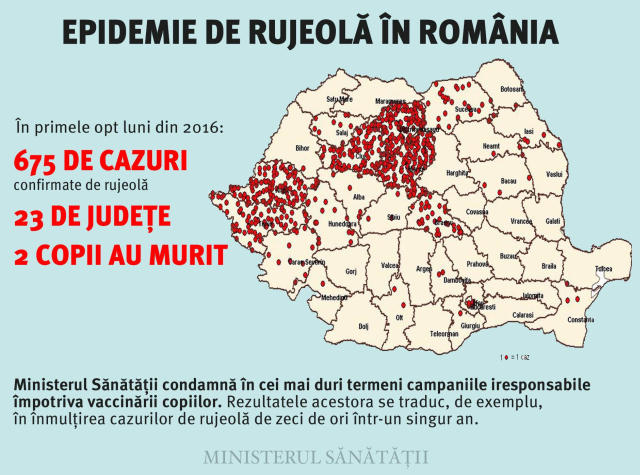Arguments in favor of vaccination
Vaccination coverage in Romania has dropped to 50-60%

Corina Cristea, 07.10.2016, 13:11
Romania ranks among the first countries in the EU in terms of deaths reported in the under-5 age category, according to data made public by UNICEF and the World Health Organization. The Periodic Alternative Report presented by the Save the Children Organization before the UN Committee on the Rights of the Child in Geneva on October 3rd shows that the phenomenon is worse in rural areas, mainly because of the lower access to medical services, the big distances between villages and the places where such services can be accessed and peoples low income there.
As regards children under the age of five, what is worrying is that half of the deaths in this age bracket could have been avoided. The analysis conducted by Save the Children has also revealed a drop in the vaccination rate and the access to medical services, especially in rural areas and in the Roma communities. Statistics show that, with regard to immunization, the coverage is below 75% in Romania, for several types of vaccines, while the WHO recommends a coverage of over 95%. Alexandru Rafila, the president of the Microbiology Society in Bucharest, spoke to us about the importance of vaccination:
“When applied on a large scale, at global level, vaccination saved hundreds of millions of lives, hundreds of millions of children who might have been severely damaged by diseases that we call preventable through vaccination. At the moment, in Europe at least, but also in the US and other regions, certain diseases have practically disappeared from the realm of infectious pathology. Their incidence has dropped dramatically and in some cases they disappeared altogether. This is why people have started thinking: ‘Why do we have to vaccinate ourselves, as long as the disease does not exist anymore? What people should know, though, is that the disease will stay extinct or appear in a very small number of cases only if we keep vaccinating children.
Vaccination saves lives, health-care experts say, also urging people to observe mandatory vaccination schemes, given that many cases of measles have appeared in Romania lately. 700 children have got it, and three of them have died. So how serious is the situation?
“The situation is very serious, which means that our vaccination coverage capacity is on the wane year after year, so much so that in certain areas across the country, in its central part or in the west, in the north-west, vaccination coverage may plummet to a very, very low and extremely worrying proportion, where only 50 to 60% of the children are vaccinated. And you see what happened this year when we witnessed the outbreak of a measles epidemics which is still rampant, and that precisely because the vaccination coverage capacity is low. Unvaccinated children allow for the measles virus to circulate among them, and this is also likely to affect children less than a year old, children for whom vaccination is not yet advisable. Vaccination is advisable for children who are at least one-year old. And then, since the virus circulates among children older than one year, those under one year of age may also run the risk of being exposed and such a risk is real in their case. And, unfortunately, three death cases have been reported this year.
Family physicians and Healthcare Ministry officials have condemned the refusal of some of the parents to have their children vaccinated. Also, the officials assured everybody that immunizations included in the National Vaccination Program are being implemented precisely because some of the diseases must be eradicated, which are serious and can prove lethal in the long run. Alexandru Rafila has insisted on a proper information campaign.
“People have to understand that, if they want to take a responsible decision for their childrens health, they must do so using professional sources. This means they need to talk to epidemiologists, infection disease specialists, microbiology experts, family physicians or pediatricians regarding the usefulness of administering a vaccine. They should not get their information from randomly picked sources on the Internet. And, unfortunately, there are even medical school graduates who do not practice medicine and who give wrong information. They are not competent, they just give information which is not valid, and a debate with a scientific reasoning cannot render their reasons credible.
We need to change something, we need to find a legislative solution so that vaccine supplies are delivered constantly, the president of the Microbiology Society also said, pointing to the fact that such a solution can also provide financing for a permanent awareness-raising campaign. Alexandru Rafila says an erratic awareness-raising campaign is insufficient. Parents ought to understand that adverse reactions are extremely rare and, on the other hand, if they fail to have their children vaccinated, they expose their children, as well as other people, to problems related to that specific infectious pathology which can be prevented through vaccination.
(Translated by M. Ignatescu and E. Nasta)






























